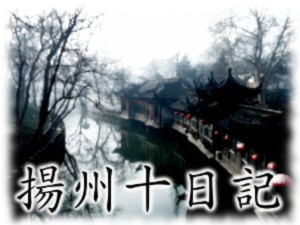揚州十日記 translation: Diary of the Ten Days of Yangzhou, Part 11
This is Part 11 in an annotation of 揚州十日記(‘Diary of the Ten Days of Yangzhou’). Like [吳城日記](http:// eastasiastudent.net/china/classical/wucheng-riji-1/ “吳城日記translation: Diary of Inner City Suzhou, Part 1”), it’s a daily log from the year 1645, a year after the Manchus took Beijing, marking the end of the Ming dynasty and the beginning of the Qing (明末清初).
This diary covers the Yangzhou massacre (also known as “The Ten Days of Yangzhou”), and was written by 王秀楚 (Wang Xiuchu). You can read about these events, as well as see more translations of the text, in Lynn A. Struve’s book Voices from the Ming-Qing Cataclysm.
As always, if you notice a mistake or have any suggestions, please share them in the comments at the end of the page.

廿八日,予謂伯兄曰:“今日不卜誰存?吾兄幸無恙,乞與彭兒保其殘喘。” On the 28th I said to my second elder brother: "We can't foretell today who might survive. You, my brother, still have your luck intact; I beg you to protect our son Peng to his last breath."
兄垂淚慰勉,遂別,逃他處。 My brother shed tears and consoled me, and then left, fleeing to another place.
洪嫗謂予婦曰:“我昨匿破櫃中,終日貼然,當與子易而避之。” Old Mrs Hong said to me and my wife: "Yesterday I hid inside the coffin, and for the whole day was snugly inside; now I should exchange places with you for hiding."
婦堅不欲,仍至柩後偕匿焉。 My wife insisted she didn't want to, and so we went behind the coffin to hide.
未幾,數卒入,破櫃劫嫗去,捶擊百端,卒不供出一人,予甚德之,後仲兄產百金,予所留馀亦數十金,並付洪嫗,感此也。 before long, several soldiers came in, broke open the coffin and pulled out old Mrs Hong; they beat her a hundred times, but in the end she did not reveal a single person, and I was extremely grateful to her; afterwards my second elder brother took out some money; what I had left was over several dozen pieces, and we put it together to pay Old Mrs Hong to show our gratitude for this.
少間,兵來益多,及予避所者前後接踵,然或一至屋後,望見柩而去。 A short while after, soldiers came in increasing numbers, those coming up to my hiding place following on one another's heels; some came behind the house, saw the coffin and left.
忽有十數卒恫喝而來,其勢甚猛,俄見一人至柩前,以長竿搠予足,予驚而出,乃揚人之為彼鄉導者,面則熟而忘其姓,予向之乞憐,彼索金,授金,乃釋予,猶曰:“便宜爾婦也。” Suddenly more than ten soldiers yelling frighteningly, their appearance extremely fierce; suddenly I saw someone go to the front of the coffin, and he used a long pole to jab at my foot - I was frightened and came out; he was a Yangzhou man who was guiding the others around; his face was familiar but I'd forgotten his surname, and I begged for mercy from him; he asked for money, and once he'd got it he then let me go, but still saying: "I've let your wife off cheaply."
出語諸卒曰:“姑舍是。” He left and said to all the soldiers: "Give this one up for now."
諸卒乃散去。 All the soldiers then dispersed and left.
喘驚未定,忽一紅衣少年摻長刃直抵予所,大呼索予,出,舉鋒相向,獻以金,复索予婦,婦時孕九月矣,死伏地不起。 My frightened gasping had still not settled when suddenly a youth in red clothes grasping a long blade came directly for my position; I came out and he raised the point of the blade at me; I gave him silver, but he also wanted my wife; my wife at that time was in her ninth month of pregnancy, and was lying rigidly on the floor, not getting up.
予紿之曰:“婦孕多月,昨乘屋墜下,孕因之壞,萬不能坐,安能起來?” I spun him a story saying: "My wife is many months pregnant; yesterday she went up on a roof and fell down and miscarried because of it; she absolutely cannot sit - how could she get up?"
紅衣者不信,因啟腹視之,兼驗以先塗之血褲,遂不顧。 The man in red clothes did not believe it, and unclothed her belly to look at it; it was doubly confirmed by the blood that we had previously smeared on her pants, and then he paid no attention to her.
所擄一少婦一幼女一小兒,小兒呼母索食,卒怒一擊,腦裂而死,复挾婦與女去。 He had already captured a young woman and her young daughter and young son; when the son called to his mother for something to eat, the soldier was angry and struck him, breaking his skull and killing him; then he grabbed the woman and girl and left.
[← Part 10](/china/classical/yangzhou-shiri-ji-10/” rel="prev “揚州十日記translation: Diary of the Ten Days of Yangzhou, Part 10”) · Part 11 · [Part 12 →](/china/classical/yangzhou-shiri-ji-12/” rel="next “揚州十日記translation: Diary of the Ten Days of Yangzhou, Part 12”)
Sources
Series: Diary of the Ten Days of Yangzhou
- 揚州十日記 translation: Diary of the Ten Days of Yangzhou, Part 1
- 揚州十日記 translation: Diary of the Ten Days of Yangzhou, Part 2
- 揚州十日記 translation: Diary of the Ten Days of Yangzhou, Part 3
- 揚州十日記 translation: Diary of the Ten Days of Yangzhou, Part 4
- 揚州十日記 translation: Diary of the Ten Days of Yangzhou, Part 5
- 揚州十日記 translation: Diary of the Ten Days of Yangzhou, Part 6
- 揚州十日記 translation: Diary of the Ten Days of Yangzhou, Part 7
- 揚州十日記 translation: Diary of the Ten Days of Yangzhou, Part 8
- 揚州十日記 translation: Diary of the Ten Days of Yangzhou, Part 9
- 揚州十日記 translation: Diary of the Ten Days of Yangzhou, Part 10
- 揚州十日記 translation: Diary of the Ten Days of Yangzhou, Part 11 (this article)
- 揚州十日記 translation: Diary of the Ten Days of Yangzhou, Part 12
- 揚州十日記 translation: Diary of the Ten Days of Yangzhou, Part 13
- 揚州十日記 translation: Diary of the Ten Days of Yangzhou, Part 14
- 揚州十日記 translation: Diary of the Ten Days of Yangzhou, Part 15
- 揚州十日記 translation: Diary of the Ten Days of Yangzhou, Part 16
- 揚州十日記 translation: Diary of the Ten Days of Yangzhou, Part 17
- 揚州十日記 translation: Diary of the Ten Days of Yangzhou, Part 18
- 揚州十日記 translation: Diary of the Ten Days of Yangzhou, Part 19
